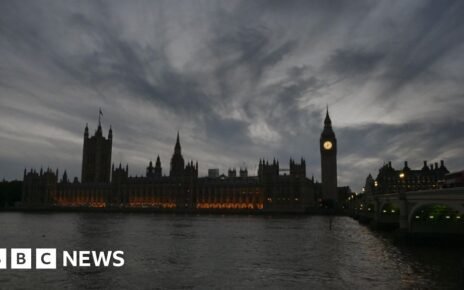[ad_1]
 Getty Images
Getty Images- A Conservative advert claims Labour increased the state pension by 75p while it has risen by £3,700 since the Tories came to power
- It misleadingly compares a single year’s rise in the weekly pension under Labour with the total rise over 14 years for the annual amount under the Conservatives
- Pensions did increase more slowly under Labour than the Conservatives, but the difference is not as big as the advert suggests: a 3.5% average annual increase under Labour and 4% under the Tories
“Remember when Labour increased the state pension by only 75p?” asks a Conservative video advert on Facebook, contrasting this with the £3,700 increase since the Tories came into government in 2010.
But this is misleading, because it compares a rise in the weekly amount over a single year with the rise in the annual value over 14 years.
It’s a message the Conservatives are pushing hard. BBC Verify analysis of the ad library data of Meta, Facebook’s parent company, suggests they have run 975 versions of this single campaign message – just changing the name of the town or city being targeted – since 21 June 2024.
The video ends with the statement: “Pensioners will always be better off with the Conservatives – don’t risk it all with Labour’s retirement tax”.
This is a reference to another claim about personal tax allowances for pensioners.
Here’s a breakdown of the claims in the much-promoted campaign video.
The ’75p pension rise’ claim
The 75p increase relates to the rise in the weekly value of the basic state pension – the older form of the pension currently being claimed by people in their 70s and over – for a single person enacted in Gordon Brown’s Budget in 2000.
This was in line with 1.1% Retail Price Index inflation in September 1999, used at the time to uprate the basic state pension.
That took the weekly value of the basic state pension from £66.75 to £67.50, an increase of 75p.
This low uprating prompted an outcry and pressure on the then Labour government to be more generous to pensioners.
The current value of the basic state pension is £169.50 per week. This works out at £8,814 per year.
In 2010, when the Conservatives entered government, the value of the basic state pension was £97.65 per week, or £5,078 per year.
So between 2010 and 2024 the annual value of the state pension rose by £3,736.

This means that in their Facebook adverts the Conservatives are comparing an increase in the weekly value of the basic state pension in a single year under the previous Labour government with an increase in the annual basic state pension under the Conservatives over 14 years.
Although pension increases were lower under Labour, the gap is not as great as the advert suggests. The average annual uprating of the basic state pension under Labour (between April 1998 and April 2010) was 3.5%, compared to the 4% average annual uprating under the Conservatives (between April 2011 and April 2024).
And the Conservatives have increased the value of the state pension relative to average earnings thanks to their post-2010 Triple Lock policy.
This has ensured (except in 2022-23 when it was temporarily suspended) that the state pension has risen in line with average wages, Consumer Price Index inflation or 2.5%, whichever is highest.
In 2010 the basic state pension was worth 19.6% of median average earnings. In 2023 that had risen to 22.9%.

The ‘retirement tax’ claim
The Tory Facebook advert also references something called “Labour’s retirement tax”, which misleadingly implies Labour is imposing an extra tax.
On the most recent official Office for Budget Responsibility projections, some pensioners existing solely on the state pension are potentially on course to pay income tax in 2027-28.
That’s because the annual value of the new state pension in that year (£12,578) is forecast to marginally overtake the tax-free personal allowance (£12,570), which has been frozen by the Conservative government.
After the election was called, the Conservatives announced the “Triple Lock Plus” policy – raising the personal allowance only for pensioners to £13,710 by 2027-28.
Labour haven’t said yet whether they will match it or not, but it would be disingenuous to imply Labour is imposing an extra tax.

Furthermore, analysis by the former Lib Dem pensions minister Steve Webb, who now works for the actuary firm LCP, suggests that around 2.5m pensioners (one in five of the total) would still be paying income tax on their state pension even if the Triple Lock Plus were introduced.
That’s because many people receive additional state pension payments due to their participation in the State Earnings Related Pension Scheme (SERPS).
The value of the state pension depends on the point at which an individual reached state pension age.
Those who reached this age before 6 April 2016 are typically entitled to the flat-rate basic state pension of £169.50 per week in 2024-25, though many will also have some earnings-related state pension after building entitlements during their working life.
Those reaching the state pension on or after 6 April 2016 are typically entitled to the flat-rate new state pension of £221.20 per week.


[ad_2]
Source link




